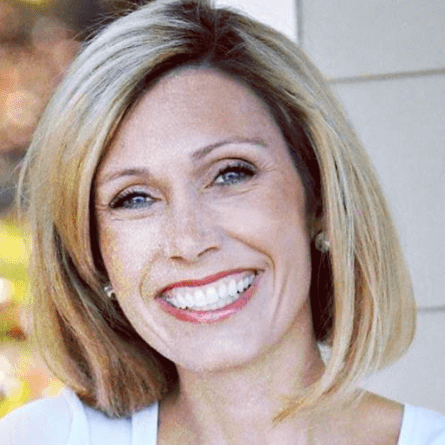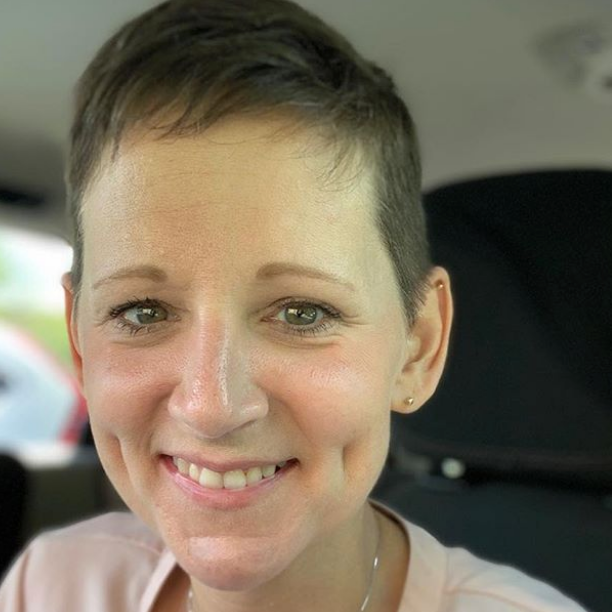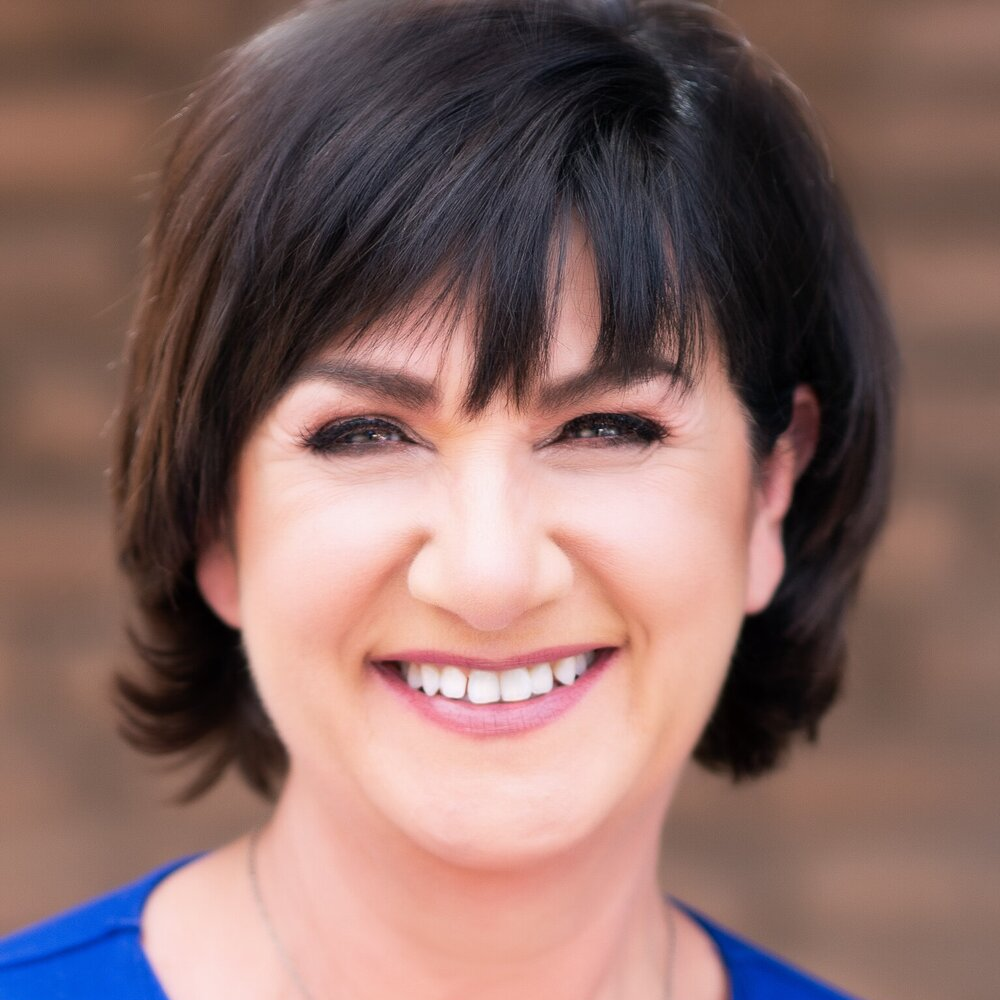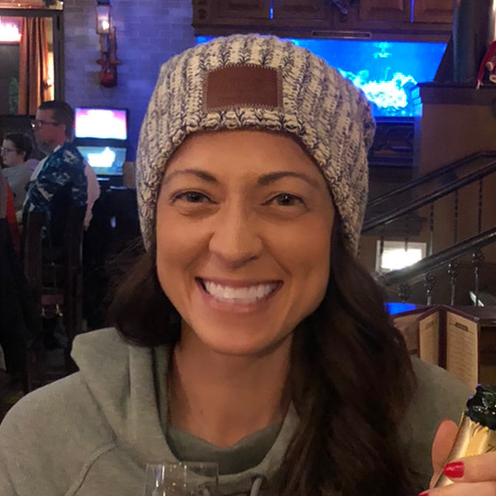Suzann’s Stage 3C Ovarian Cancer & BRCA1+ Story
Suzann shares her stage 3C ovarian cancer story, testing positive for the BRCA1 gene, and getting diagnosed after not being able to urinate.
In her story, Suzann shares undergoing surgery and chemotherapy, and she highlights how she navigated life with cancer, including losing her hair, how the diagnosis impacted her relationships, and what support was most important for her through the experience. Thank you for sharing your story, Suzann!
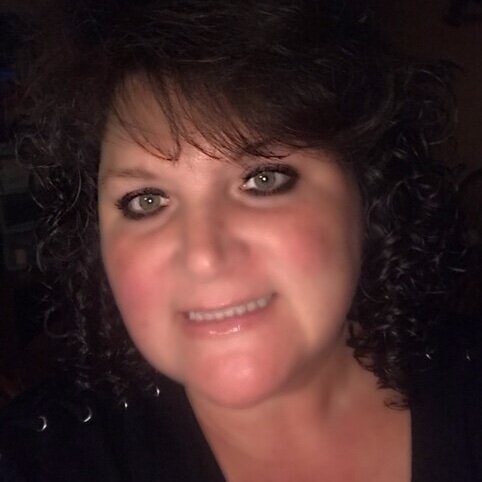
- Name: Suzann B.
- Diagnosis:
- Ovarian cancer
- BRCA1+
- Staging: 3C
- 1st Symptoms:
- Inability to urinate
- Treatment:
- Surgery
- Debulking surgery
- Total hysterectomy
- Chemotherapy
- Carboplatin & Taxol (CT)
- 20 treatments
- Oral maintenance chemo
- Taken twice daily
- Carboplatin & Taxol (CT)
- Surgery
- Diagnosis
- Treatment
- Reflections
- How has the whole experience changed your outlook on life?
- What was your lowest point?
- Can you talk about hair loss?
- Can you talk about how cancer has affected your new relationship?
- Can you talk about your support system?
- What’s your advice for people who want to help but don’t know how?
- What advice do you have for someone who has just been diagnosed?
This interview has been edited for clarity. This is not medical advice. Please consult with your healthcare provider for treatment decisions.
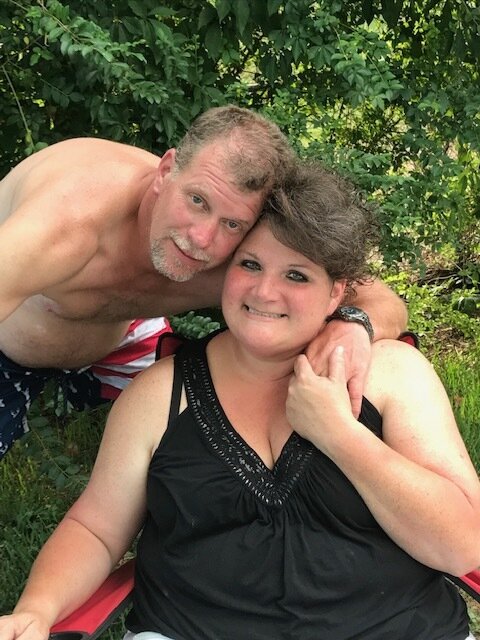
Keep a positive attitude. You must not let yourself think negative. I have said since the day I was diagnosed that I was not going to let this crap kill me.
You must make up your mind that you are going to beat this dreadful disease. You need to start thinking, ‘How are we going to get rid of this cancer?
Suzann B.
Diagnosis
What were your first symptoms?
I couldn’t pee. I’ve been ER nursing for years, and my husband passed away from cancer almost two years ago. I decided I wanted to slow down and stop nursing in the ER.
About a year ago, I was at work, and I couldn’t pee. It happened three or four times, and I had to be catheterized.
How did you get the diagnosis?
My uro-gyno told me I had nursing bladder, and I said that’s not true. I went to the gynecologist, and he did an exam.
He called me back a week later and said I had cancer.
I had what I thought was a stomach virus, and I went to the ER. I had a CT, and they said I had a cyst on my ovary. My gyno pulled it up and told me it was cancer.
Whenever he did my Pap smear, the cancer was so far advanced that it showed up on the Pap. Ovarian cancer rarely shows up like that.
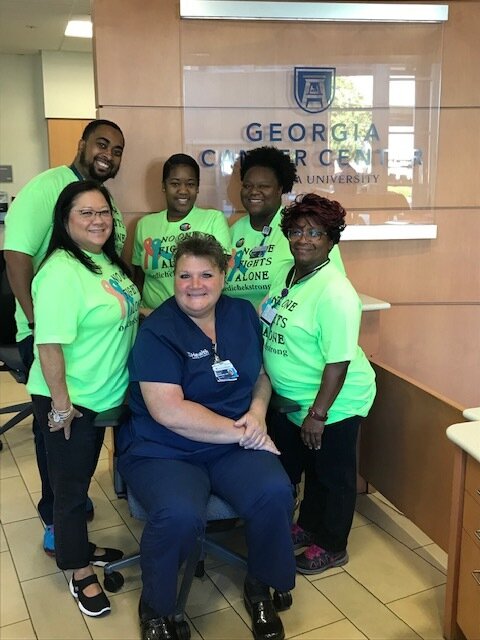
How did you process your diagnosis?
I was working in triage, and my phone started ringing. I looked down and saw the name. I saw that it was my doctor, and I said, “This isn’t gonna be good. I had a Pap done the other day, and he’s calling me on my cell phone? This isn’t good.”
I answered, and he said, “Do you want to talk on the phone, or do you want to come in and talk to me?” I said, “I want you to tell me what you’ve got right now.” Then he told me. I lost it.
»MORE: Processing a cancer diagnosis
How did you tell your family?
Telling my family was the hardest. I called them and told them I needed to talk to them. I told them I was leaving work and headed to my daughter’s house.
I told them to meet me there. They knew something was up because they had known I went to the doctor.
They put two and two together because they said it was the same as it was with my husband. Morgan is 18, and Taylor is 26. That was hard because Morgan was at home.
My grandbaby is smart. I let his parents tell him. When he found out, he wanted to know if I was gonna die like his grandpa did.
My kids handled it better than I thought. They were in fight mode like me. They just wanted to know what was next.
»MORE: Breaking the news of a diagnosis to loved ones
Treatment
What was your first surgery like?
I had surgery before and after chemo. The first one was supposed to be a total hysterectomy. I had what they thought was a large hernia, and they were gonna try to remove that.
The hernia ended up being nothing but cancer. They removed that. The cancer was all in my omentum, my bladder, my intestines. It was everywhere. My ovaries had ruptured.
She tried to do a hysterectomy, but she couldn’t. She would’ve had to do a colostomy or urostomy or both. I did not want that. If we could take our chances, shrink it with chemo, and then try another surgery, that’s what I wanted to do. So that’s what we did.
Recovery was hard.
I had an incision from above my belly button all the way down. I was in pain when I woke up from surgery. My first surgery was June 17th, and I started chemo on June 27th.
»MORE: Read more patient experiences with surgery
What was your chemo regimen?
I went every Thursday. I had 20 treatments. I was on Taxol and carboplatin. When you go in, they check your blood. They make sure your counts are good enough to start treatment.
If you need fluids, you get fluids. Whenever you check in, they take you back and put you in your recliner.
I brought my phone and some headphones and tried to go to sleep. Just the thought of having it done made me anxious, so I’d just try to lay there and sleep.
What side effects did you have from chemo?
Nausea. Nausea was so bad. My bones have been hurting, too. I’m actually still on oral chemo, and I will be the rest of my life.
It makes my bones ache. It feels like a fire poker is in there with them.
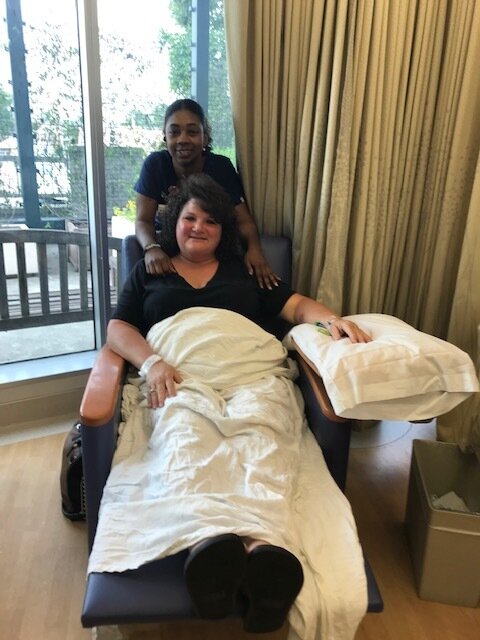
How was the second surgery?
We had a scan after several chemo treatments, and they saw it was all shrinking down. She thought she could get it without having to do the ostomy.
She was able to do that surgery on September 23, 2019. She removed all the cancer she could see and gave me a hysterectomy.
I’m just now healing from that surgery. In fact, there’s still a pinpoint opening. My incision took forever to heal, and they said that was because of all the chemo.
You did genetic testing?
Now I’m having to alternate CTs and mammograms of my breasts because of the gene factor. The genetic testing was easy. It was just drawing blood. So far, I’m the only one in my family who has tested positive for the BRCA1 gene.
They want me to have a double mastectomy, but I’m just not in for that right now. I’ve been through too much. It’s too soon. I don’t want another incision. I’d rather just do close surveillance on it.
»MORE: Read our interview with a genetic counselor
Where do you stand now?
I’ve had two scans since that surgery, and they’ve both been clean. I’m in remission now. I was told on the Monday before Christmas that I was in remission. I’m on oral chemo now. I take it twice a day.
Before insurance, it’s about $24,000 a refill, and I get it refilled two or three times a month. They’re not joking when they say chemo is expensive. Thank God for insurance and discount cards.
It makes me really tired. I was having bad nausea, but that’s subsided for the most part. It makes my bones hurt. I guess it’s like arthritis. It hurts. I feel like an old person. It just hurts a lot.
I’ve been taking Motrin and Tylenol for it, but it doesn’t help much. I sure don’t want to get off of it, though, because it’s doing such a good job keeping me in remission.
What is your doctor follow-up schedule?
I see my doctor once a month and have blood work. I have CT scans every 3 months.
Reflections
How has the whole experience changed your outlook on life?
I don’t take things for granted anymore. I thank God every time I roll out of bed and can stand up. I say, “Thank you, Jesus, for another day.”
When you’re going into surgery, you think about everything. When you go in for chemo, you think about the possibility of it not working.
I’ve always been compassionate with my patients, but I’m 100 times more compassionate now. It’s different when you know how they feel.
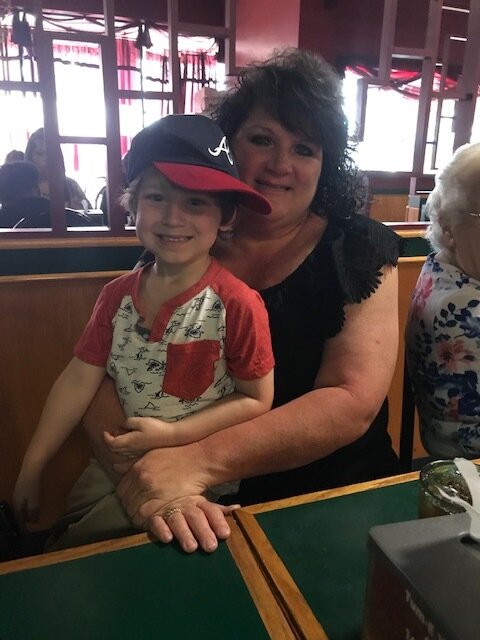
What was your lowest point?
One of my lowest points during treatment was the fear of the unknown. Not knowing if I was gonna lose my house, not knowing how I was going to pay my bills, and most of all, not knowing if I was going to live.
I was worried about my girls also — yes, they are older, but they are still my babies. Not to mention I have small grandbabies who would not understand why NaNa was going to look different and not be as active with them as I’ve always been.
I didn’t know how they would handle this news, especially after we just lost my husband (their daddy) to cancer almost exactly a year to the day before I was diagnosed. Morgan still lived at home, and I didn’t want her to see me sick. Not being able to be the mother that she was used to was hard.
I remember one night, my sister was packing my incision for me, and it was like I was paralyzed. I couldn’t move, couldn’t talk, and Morgan came into my bedroom and asked, “What is wrong with my mama?” I couldn’t answer, but my sister told her I was having a bad day with chemo. I remember thinking I just need to talk to my husband, and my girls need their daddy.
Can you talk about hair loss?
I started losing my hair on my birthday, July 12th. My boyfriend, Kelvin, and I went to the lake for the weekend with my sister and her husband at the cabin. Kelvin loves to fish, and we thought it would be a good break.
When I washed my hair, it started coming out in handfuls. I remember thinking, “Please don’t all come out at one time while we are here at the lake.” I was devastated. I was scared to be bald. I was scared for anyone to see me bald, especially Kelvin.
I had a lot of dark brown curly hair that was very thick, and I prayed that I would not lose all of my hair. I never totally lost all of it, but it came very close. I had a very large bald area on the back of my head. The hair on top of my head got so thin that you could see more scalp than hair.
I had to stop chemo three weeks before surgery, and during that three weeks the hair began to grow back in the bald spot on the back of my head. I actually went to get my head shaved, and she looked at me and said, “Why are you shaving it?”
»MORE: Dealing with hair loss during cancer treatment
I told her that I had a huge bald spot on the back of my head, and I could not bear to look at it. She started smiling and said, ‘You don’t have a bald spot. It’s covered in fine hair.’ She just cut the little bit of long hair I still had really short.
I no longer looked like a scary corpse that had been in a coffin for 200 years. Kelvin and my family told me they didn’t care if I lost every strand of hair and that it was only hair and didn’t matter.
I even lost my eyebrows and eyelashes. Now that my hair is growing back, it’s a different color and texture. It has a lot of gray in it. My eyebrows are even gray, but at least I have hair.
Can you talk about how cancer has affected your new relationship?
Kelvin and I met a few months before I was diagnosed, but we really started seeing each other about a month and half before I was diagnosed. I was so scared to tell him that I had cancer. I was scared he may have thought it was just going to be too much.
I tried to call him to tell him before I told anyone else, but I could not get him on the phone. He was at work and couldn’t get the call in the plant.
I called his son, who was able to get a message to his dad to call me. Kelvin called, and I was very hesitant to tell him.
I had a huge lump in my throat, and I remember him saying, “Baby, just tell me what you need to tell me.” After I told him I had cancer, his response was, “Well, what are we gonna do about it?”
I was afraid he may not want to have to deal with this journey, but he has been there for me the entire way. He has seen me at my worst (in post-op after surgery and many other times).
We have for sure been tested. He was with me at my last chemo infusion treatment (as well as my family and many friends) and recorded me ringing the bell. He would call me on his break every Thursday morning to check on me while I was having my chemo infusion.
Having cancer and being in a “new” relationship with someone with cancer is not for a weak person. Kelvin has put up with me being fine one minute and nauseated the next. He has waited on me numerous times while I was having my incision packed two times a day.
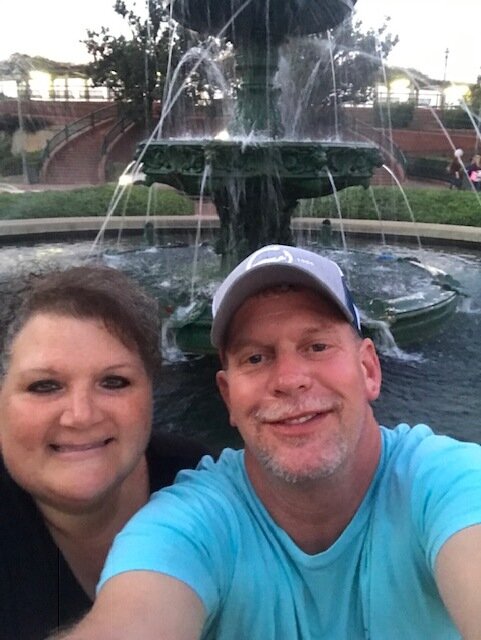
This past year has really been a trying time for us due to my diagnosis with ovarian cancer, and he himself had a heart attack in November and had to have two stents placed. He then had another cardiac event in late January and was hospitalized for 5 days.
We have been there for each other and have been each other’s rock. I like to think we have passed the ‘test.’ I do love him very much.
Can you talk about your support system?
I have such a good support system with my family and friends. I had people coming in and giving me everything I needed. My support system, my friends, my coworkers and bosses — they’re all amazing.
I started seeing somebody a month before I was diagnosed. I thought he wasn’t gonna want to stick around. Well, we live together now. He stuck it out.
»MORE: What kind of support cancer patients say helped the most
What’s your advice for people who want to help but don’t know how?
If you know someone who has cancer and they say they want a cupcake, then try your best to give them a cupcake or whatever it is they may want, because most of the time, it’s a simple solution. I craved ice cream the whole time I was in active chemo infusion.
One of the biggest ways to support a cancer patient is to just be there and listen to them. No matter if it’s crying, fussing, or singing. It’s the simple things that mean so much. The daughter of a friend of mine knitted me a beanie hat, and it meant so very much.
One thing you take for granted is being able to clean your house, so just taking out the trash or sweeping the floor is very much appreciated.
What advice do you have for someone who has just been diagnosed?
Keep a positive attitude. You must not let yourself think negative. I have said since the day I was diagnosed that I was not going to let this crap kill me.
You must make up your mind that you are going to beat this dreadful disease. You need to start thinking, “How are we going to get rid of this cancer?” Then, “What can I do to keep the cancer in remission?”
Keep telling yourself it’s not going to kill you and that you’re going to beat it and you will be a survivor.

Inspired by Suzann's story?
Share your story, too!
Ovarian Cancer, High Grade Serous Stories
Randalynn V., High-Grade Serous Carcinoma, Stage 1C
Symptoms: Pulling sensation when emptying bladder; abdominal pain
Treatments: Chemotherapy (carboplatin & paclitaxel), surgery
...
Shirley P., High-Grade Serous Carcinoma, Stage 3C, BRCA1+
Symptoms: Pulling sensation when emptying bladder; abdominal pain
Treatments: Chemotherapy (carboplatin & paclitaxel), de-bulking surgery, PARP inhibitors
...
Suzann B., High-Grade Serous Carcinoma, Stage 3C, BRCA1+
Symptoms: Inability to urinate
Treatments: Chemotherapy, de-bulking surgery, total hysterectomy
...
Susan R., High-Grade Serous Ovarian Cancer, Stage 4
Symptoms: Pulling sensation when emptying bladder, abdominal pain
Treatments: Chemotherapy (carboplatin & paclitaxel), surgery
...
Sara I., High-Grade Serous & Clear Cell Carcinoma, Stage 3A
Symptoms: Random sharp pains, unrelated scan showed ovarian cyst
Treatments: Debulking surgery, chemotherapy (carboplatin & paclitaxel), PARP inhibitors (clinical trial)
...
